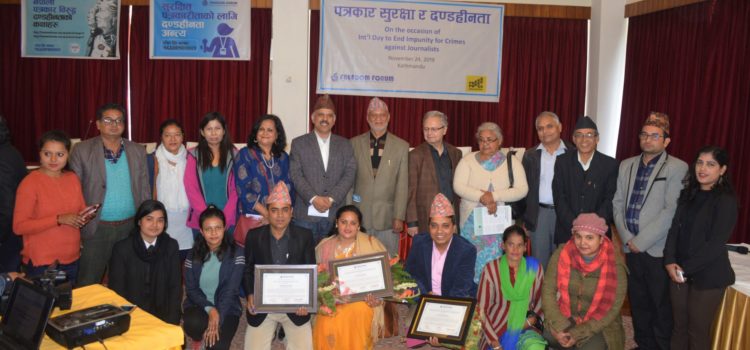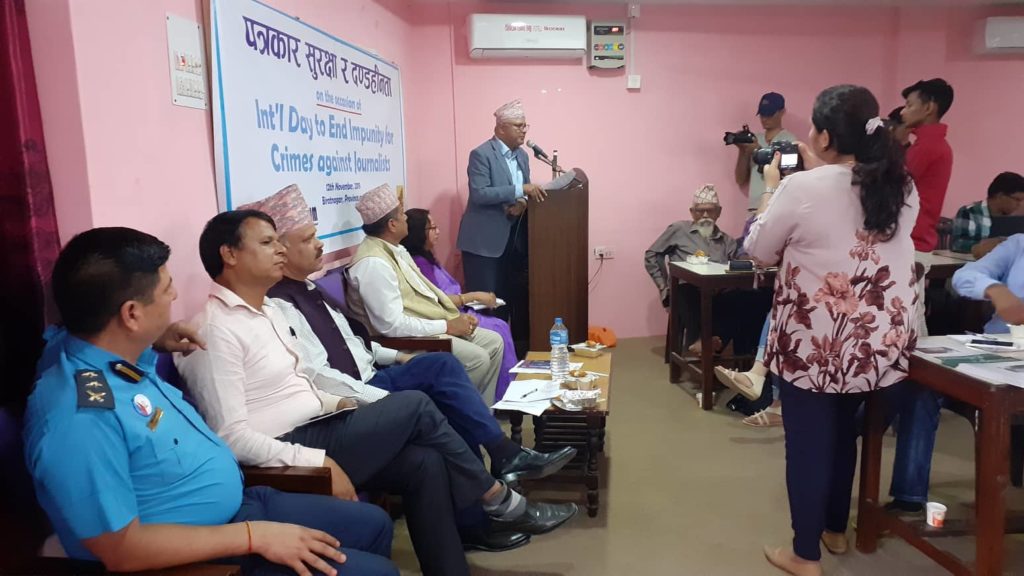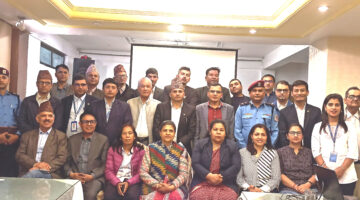Deepa Adhikari
FF marks End Impunity Day in a grand manner
‘The International Day to End Impunity for Crimes against Journalists’ is marked across the world on November 2 every year. It is observed in a bid to raise awareness on journalists’ rights, express solidarity to the campaign of journalists’ safety and advocate for justice to the victim journalists and media persons in order to end impunity for the crimes meted out against them.
Even the UN announced the Day in 2013 to be marked across the globe in response to the continuous lobby of the organizations working for freedom of expression in commemoration of the deadly attack and killing of 32 media persons and journalists named as Ampatuan Massacre (also known as Maguindanao Massacre) in the philippines in 2009.
Freedom Forum also observed the Day with the support of the Free Press Unlimited across the country this year too.
During the programs, it was reminded that Nepali journalists had to face tough times, while some of them lost their lives especially during the conflict and post-conflict period. Such programs held at present with relative political development following the peace process are still relevant- pressing indeed- for the journalists and their families victimized during the conflict are still waiting for justice. The impunity related to this is yet to be addressed.
National Human Rights Commission Chairperson Anup Raj Sharma expressed worry that the government did not become serious to address the transitional justice issues despite the Supreme Court’s order to amend laws on time. During the international forum- UN Human Rights Committee- the Foreign Minister made the commitment to address it, but no substantial task was taken till date, he blamed. Such activities make democracy dysfunctional.
“Mere written and verbal commitment are not enough, it must be translated action,” he urged the government, complaining, “How shameful on the part of government to not deliver justice to the conflict victims in these 13 years after the beginning of peace process in Nepal.”
According to him, a strategic partnership is essential to curb impunity in Nepal. “Pressure is must on the government for justice,” he stressed, informing that the NHRC would implement the journalist safety mechanism to which FF and NHRC had worked some years back. He expressed severe concern mover declining democratic values in Nepal’s political system.
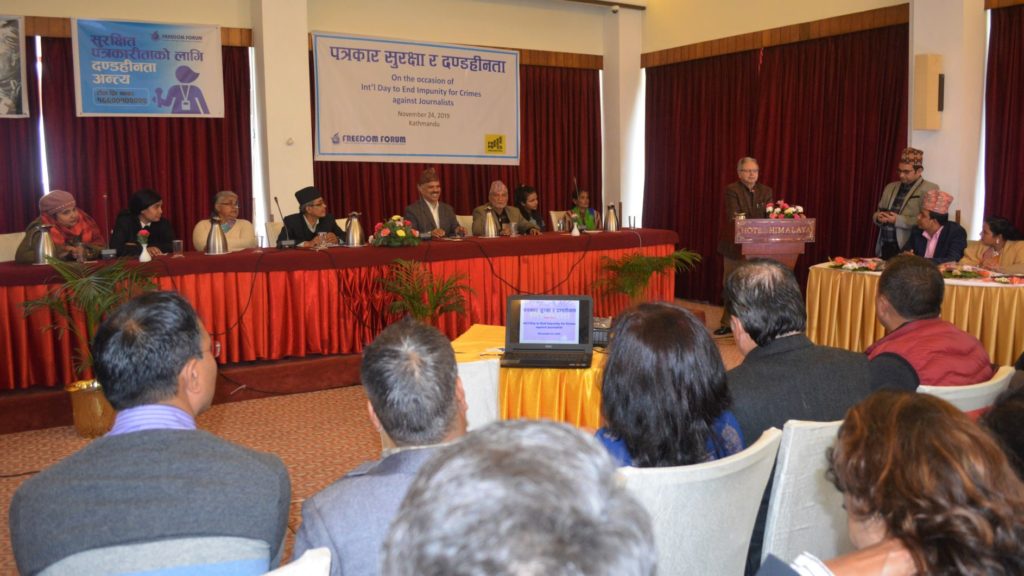
Addressing the program, Former Chief Justice Mrs Sushsila Karki said, ”Journalism is a risky job in third world. In Nepal’s case, journalism has 50 percent role on its development.” She stressed that journalism must not be controlled rather it should be self censured. The harrowing stories shared by the members of the victims journalists are quite moving. They must be catered justice on time, she stressed.
On the occasion, Executive Chief Taranath Dahal reminded that FF organized such programs across the country and secured participation and commitments of the concerned ministers to address the pressing issue of impunity relating to crimes against journalists. “This program is not only to provide platform for the family members of victim journalists but also a strong reminder to the authorities concerned and the moment to award the journalists and RTI campaigner for their passion to bring change in society with the exercise of freedom of expression and information,” he stressed.
Former President of the Federation of Nepali Journalists (FNJ) and Press Council Nepal, and coordinator of award selection committee, Mr Harihar Birahi, also worried that journalists are still working under threat and fear. Self-censorship has ruined independent reporting. Misuse of media is also a growing concern, he added. “As the press itself is in terrified state, other sectors are obviously also under threat,” he underscored.
Elusive justice suffers members of victim journalists
Also speaking on the occasion, Ms Manisha Dhital, daughter of slain media entrepreneur, Devi Prasad Dhital, wondered, “Who killed my father and why? The police officials used to say the murder will be found soon. But, why not apprehended him/her till date? Don’t we have right to get justice?”
Basanti Devi Joshi, spouse of disappeared journalist, JP Joshi, viewed sobbingly, “Only a ruined skeleton was shown to us. A small monetary help was given very late. Since that, I’ve been raising children with much paucity and backwardness. I’ve not got justice. I kindly request every one of you again to continue lobbying for the justice. Who killed my husband? And why?” She questioned the justice system of Nepal.
Shabu Sharma, daughter of slain journalist, Nabaraj Sharma ‘Basanta’, recalled, “I was very young. I was not aware about the murder of my father. My mother also died after five year of my father’s killing, much to the trauma. We have even a younger brother. We- orphans- were picked up for help by a welfare organization. Now, when some say ‘father’, ‘mother’, I find it awkward, weird. We, the hapless children faced dark days for long. Now, we are coming together with you people. When I came to know my family needed justice, then I decided to study law. I’m now LLB student.”
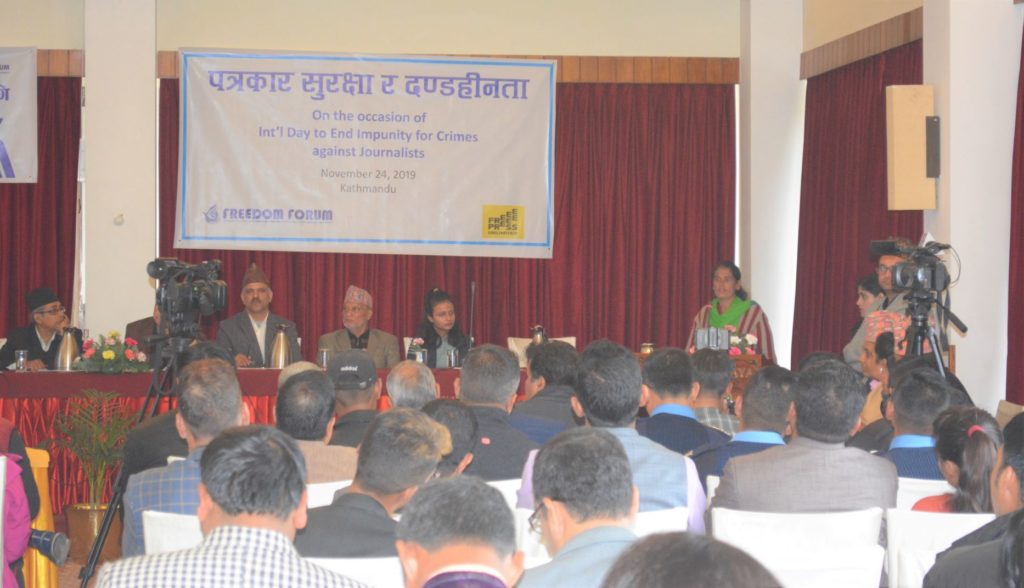
Moreover, Trishna Acharya, daughter of slain journalist, D Kaundinya, requested all sides available there to continue the issue of justice to victim journalists’ family even after leaving the program venue. “I condemn the government for keeping us in this dark, for not addressing our voices, for not providing justice to our parents’ murder”, she fumed.
Concluding the function, FF Chairperson Haribinod Adhikari said all sides effort was needed to voice for journalists right and justice to victim family. FF created such platform to share the information on the status of impunity, which, he said would help reduce violation of freedom of expression in the days ahead.
A total of 100 participants from media, human rights, security agency, legal practice, politics, government bodies, research, and CSOs took part in the event. Even the representatives of FF from seven provinces took part in the program. Among them, 69 were male and 41 female.
Award
In the same program, Economic Bureau Chief of Kantipur Daily, Mr Krishna Acharya, was conferred on the Investigative Journalism Award in recognition to his contribution to the sector of economic development via journalism with special focus on tax scam, money laundering and financial crime, bringing to light the financial irregularities and corruption. It made aware the public, administration, policy makers and implementers to change both in thoughts and behaviour for building good governance with reform in the relevant sectors in Nepal. The use of right to information (RTI) for the investigative reporting he did for over a decade also enhanced trust and credibility in media. It has also contributed to free media, good governance and democracy.
Similarly, RTI campaigner and advocate, Mr Bishwajeet Tiwari, was handed over the Best RTI Activist Award, in recognition to his continuous efforts in the sector of public interest and good governance with the right to information (RTI) activism. Disclosure of facts and documents from the public agencies with the filing of hundreds of RTI applications made public aware about the misuse of public resources, irregularities and corruption at local and provincial levels, which ultimately prodded the concerned agencies for improvement and enhancement of citizen’s role on participatory democracy. Despite facing hostile situation, Mr Tiwari continued endeavour for good governance for over a decade with RTI awareness, campaign and training that helped bring reform in the system.
Radio journalist Mrs Sunita Rawal, was given the Courageous Journalism Award for her passion and patience to continue journalism to inform public on the issues of importance and bring change in society with the reform in various sectors. In addition to building informed citizenry, the journalism she did irrespective of the hassles and threat encouraged many fellow journalists to pursue career for the public good. She has waged struggle to get justice after the State owned Radio Nepal sacked her without prior information. She is confident that she would boost the morale for women empowerment to build equitable society.
Every award carries a purse of Rs 25,000 along with the appreciation letter.
Earlier, on the same occasion, FF organized a program in Biratnagar city of Province 1 on November 11.
On the occasion, FF Executive Chief Taranath Dahal, reminded that the Day is marked in memory of the journalists killed en masse in Philippines in 2009. In this connection, FF is conducting this campaign across the country, drawing attention of stakeholders including government, police, human rights defenders and security agencies and law enforcement agencies, he added.
He further said the objective of the day is to review the challenges being faced by journalists for their works and create pressure to enable environment conducive for journalists. It is also to demand commitment from stakeholders to ensure safe working environment for journalists.
Minister for Internal Affairs and Law at Protince-1, Hikmat Karki, viewed local body is mandated to regulate local media and they were working to develop mechanisms for creating environment to cover the news and build opinions. Safe environment for freedom of expression and right to information is the responsibility of local government so we are focusing on local and provincial governments.
National commitment for SDGs and several programs are being made. SDG goal 16.10.1 is safety of journalists. No journalists should be the subject of attacks and harassments while carrying out their duty to inform the public, he stressed.
Province-1 General Secretary of the Federation of Nepali Journalists, Bibek Gautam, complained that state involved crimes against journalists are not well-reported and obviously not put forward for legal recourse. Itahari mayor Dwarika Lal Chaudhary’s blatant threat to journalists was one of the recent examples showing the situation of press freedom. FNJ mission took place and suggested the victim to go for legal recourse in the case.
Threat to journalist physical and professional safety are increasing and the state of self-censorship is still on, he added, informing that the state apparatus are still involved in creating fear against journalists.
Morang Chapter Chair of FNJ, Bandhu Pokharel, viewed media is sometimes more stronger than political parties. Struggle for democracy and freedom is still on. “We think that the political parties which were the ally in the fight for democracy and rights now are maintaining indifference to press freedom and freedom of expression,” he observed.
District Police Office Chief, Superintendent of Police, Biswo Adhikari, said media vigilance on police is welcomed but it should be constructive. Impunity is the failure of regime and governance. Nepal Police is committed to provide security to journalists and people, he added.
FNJ Province 1 Chair Bikram Luitel said there are two types of threats – physical and psychological –still marring journalists to exercise their media freedom. Itahari municipality Mayor issued threat but all remained silent. Neither the ruling political parties nor the government took stern action against him. The ruling party did not even ask a single question. Press freedom violation incidents are decreasing because we are not writing any news against local government and we are taking some incentives from local government, he mentioned.
INSEC Province 1 Chief, Som Raj Thapa, said the crimes against journalists are increasing according to INSEC human rights year book. Not only police but other state mechanisms are also hostile to media freedom. Criminalization of politics and the politicization of crimes have created trouble, according to him.
National Human Right Commission Province-1 Acting Chief Tika Dahal, shared even the NHRC was also monitoring the status of human rights violations including media freedom. It also issues press alerts and statements.
Biratnagar Metropolis Mayor Bhim Parajuli said, “We are committed to defending media freedom and ending the related impunity. I know the pain and plight of journalists as I used to practice journalism. There are high risks to journalists from physical and psychological aspects.”
Earlier, on the same occasion, FF organized a program in Biratnagar city of Province 1 on November 11.
On the occasion, FF Executive Chief Taranath Dahal, reminded that the Day is marked in memory of the journalists killed en masse in Philippines in 2009. In this connection, FF is conducting this campaign across the country, drawing attention of stakeholders including government, police, human rights defenders and security agencies and law enforcement agencies, he added.
He further said the objective of the day is to review the challenges being faced by journalists for their works and create pressure to enable environment conducive for journalists. It is also to demand commitment from stakeholders to ensure safe working environment for journalists.
Minister for Internal Affairs and Law at Protince-1, Hikmat Karki, viewed local body is mandated to regulate local media and they were working to develop mechanisms for creating environment to cover the news and build opinions. Safe environment for freedom of expression and right to information is the responsibility of local government so we are focusing on local and provincial governments.
National commitment for SDGs and several programs are being made. SDG goal 16.10.1 is safety of journalists. No journalists should be the subject of attacks and harassments while carrying out their duty to inform the public, he stressed.
Province-1 General Secretary of the Federation of Nepali Journalists, Bibek Gautam, complained that state involved crimes against journalists are not well-reported and obviously not put forward for legal recourse. Itahari mayor Dwarika Lal Chaudhary’s blatant threat to journalists was one of the recent examples showing the situation of press freedom. FNJ mission took place and suggested the victim to go for legal recourse in the case.
Threat to journalist physical and professional safety are increasing and the state of self-censorship is still on, he added, informing that the state apparatus are still involved in creating fear against journalists.
Morang Chapter Chair of FNJ, Bandhu Pokharel, viewed media is sometimes more stronger than political parties. Struggle for democracy and freedom is still on. “We think that the political parties which were the ally in the fight for democracy and rights now are maintaining indifference to press freedom and freedom of expression,” he observed.
District Police Office Chief, Superintendent of Police, Biswo Adhikari, said media vigilance on police is welcomed but it should be constructive. Impunity is the failure of regime and governance. Nepal Police is committed to provide security to journalists and people, he added.
FNJ Province 1 Chair Bikram Luitel said there are two types of threats – physical and psychological –still marring journalists to exercise their media freedom. Itahari municipality Mayor issued threat but all remained silent. Neither the ruling political parties nor the government took stern action against him. The ruling party did not even ask a single question. Press freedom violation incidents are decreasing because we are not writing any news against local government and we are taking some incentives from local government, he mentioned.
INSEC Province 1 Chief, Som Raj Thapa, said the crimes against journalists are increasing according to INSEC human rights year book. Not only police but other state mechanisms are also hostile to media freedom. Criminalization of politics and politicization of crimes have created trouble, according to him.
National Human Right Commission Province-1 Acting Chief Tika Dahal, shared even the NHRC was also monitoring the status of human rights violation including media freedom. It also issues press alerts and statements.
Biratnagar Metropolis Mayor Bhim Parajuli said, “We are committed to defending media freedom and ending the related impunity. I know the pain and plight of journalists as I used to practice journalism. There are high risks to journalists from physical and psychological aspects.”
Violence against journalist won’t be tolerated: Province-2 Minister Yadav
Similarly, at the program held to mark the Day in Janakpur on November 9, Province 2 Minister for Internal Affair and Law, Gyanendra Kumar Yadav committed that his Province would work for the safety of journalists and media workers. Victim family would be supported. The Province will not tolerate any kind of violence against journalists, he said, informing that they were planning for journalists’ insurance to provide them financial security.
At the program, FF Chairperson Hari Binod Adhikari opined that to ensure press freedom and human rights, impunity must be ended. Adhikari said, “Without press freedom, democracy cannot be saved, therefore, the government should play important role to end impunity for crimes against journalists.”
At the program, FF gathered 30 participants from media, human rights defenders, legal practitioners, political representatives, right to information campaigners and a representative from civil society organizations.
Both State, Journalists should be aware: Gandaki Province Minister Chuman
Moreover, at the program organized to mark the International Day to End Impunity for Crimes against Journalists at Gandaki Province in November, Minister for Internal Affairs and Law, Hari Bahadur Chuman, said both the State and journalists should be aware to end impunity for crimes against journalists. “I’m committed to making State side respected,” he vowed.
Similarly, Kaski District Chief Administrative Officer, Ramesh Kumar KC, said the journalism should be made professional. “If anyone faces threat because of writing news, we look after for his/her safety,” he said, adding not only physical but also economic and social status of journalists should be viewed equally.
Gandaki Province Chief of Police, SSP Rajeshkumar Lal Karna, however, admitted that it was difficult for the journalists to collect news during the VVIP’s visit owing to their security concern.
Similarly, university teacher Bedhari Timilsina said journalism can not function properly in pressure and intimidation.
Noted journalist Narayan Karki viewed that journalism was facing growing risk because the journalists were acting as political parties’ spokesperson.
Ms Bina Shilwal from NGO Federation said new journalists were not finding guardianship to develop profession.
Moreover, active journalist Sarita Pangeni argued that the bills and acts the government brought recently were creating adverse atmosphere for investigative reporting.
Advocate Rammaya Lamichhane from Freedom Forum said cooperation to media from other sector was essential for the media is a tool to build informed citizenry.
Violence against journalist won’t be tolerated: Province-2 Minister Yadav
Similarly, at the program held to mark the Day in Janakpur on November 9, Province 2 Minister for Internal Affair and Law, Gyanendra Kumar Yadav committed that his Province would work for the safety of journalists and media workers. Victim family would be supported. The Province will not tolerate any kind of violence against journalists, he said, informing that they were planning for journalists’ insurance to provide them financial security.
At the program, FF Chairperson Hari Binod Adhikari opined that to ensure press freedom and human rights, impunity must be ended. Adhikari said, “Without press freedom, democracy cannot be saved, therefore, the government should play important role to end impunity for crimes against journalists.”
At the program, FF gathered 30 participants from media, human rights defenders, legal practitioners, political representatives, right to information campaigners and representative from civil society organizations.
Both State, Journalists should be aware: Gandaki Province Minister Chuman
Moreover, at the program organized to mark the International Day to End Impunity for Crimes against Journalists at Gandaki Province in November, Minister for Internal Affairs and Law, Hari Bahadur Chuman, said both the State and journalists should be aware to end impunity for crimes against journalists. “I’m committed to making State side respected,” he vowed.
Similarly, Kaski District Chief Administrative Officer, Ramesh Kumar KC, said the journalism should be made professional. “If anyone faces threat because of writing news, we look after for his/her safety,” he said, adding not only physical but also economic and social status of journalists should be viewed equally.
Gandaki Province Chief of Police, SSP Rajeshkumar Lal Karna, however, admitted that it was difficult for the journalists to collect news during the VVIP’s visit owing to their security concern.
Similarly, university teacher Bedhari Timilsina said journalism can not function properly in pressure and intimidation.
Noted journalist Narayan Karki viewed that journalism was facing growing risk because the journalists were acting as political parties’ spokesperson.
Ms Bina Shilwal from NGO Federation said new journalists were not finding guardianship to develop profession.
Moreover, active journalist Sarita Pangeni argued that the bills and acts the government brought recently were creating adverse atmosphere for investigative reporting.
Advocate Rammaya Lamichhane from Freedom Forum said cooperation to media from other sector was essential for the media is a tool to build informed citizenry.
Karnali State ready to end impunity relating crimes: Karnali State Minister Bhandari
Similarly, on November 18, Freedom Forum and Karnali Foundation jointly held a program on this occasion in Karnali Province. At the program held at Birendranagar, which was attended by 41 persons from various fields as media, academia and government, Minister for Internal Affairs and Law in the State, Naresh Bhandari, showed commitment that Karnali Province was ready to end impunity for crimes against journalists.
He admitted that activities against free press were growing. “Therefore, Karnali Province would take initiative to end violence against journalists,” he vowed, adding the journalists should also abide by the code of conduct. The Minister added that Karnali government has launched health insurance program for financial security of journalists. According to him, Rs 250,000 was provided to the family of journalist Nandu Gelang who had died in accident.
Chief Attorney of Karnali Province, Bidhya Bhusan Manandhar, however, said once the journalists maintained free and fair conduct, press freedom violation would decline.
Similarly, Police Chief at Karnali Province, Purna Chandra Joshi, said the police authority was always ready to work together to reduce impunity relating to crimes against journalists.
Vice Chairperson of Federation of Nepali Journalists in Karnali Province, Dambar Acharya, demanded that State provided safety to the journalists.
Reporter for Gorkhapatra daily from Surkhet, Muna Hamal, shared that not only she but also her family was panicked for reporting.
Another journalist Yagya Khatri said atmosphere for free reporting was ruined lately.
On the occasion, FF General Secretary Dharmendra Jha presented the data showing growing trend of press freedom violation in the recent years. “If journalists themselves are not safe, how can the rights of common citizen be ensured in the country,” he wondered, urging all concerned to make collaborative efforts to brave increasing hostility to freedom of expression in recent time in Nepal.
Unite in single umbrella for rights, Minister suggests journalists
FF also organized a program in Sudur Paschim Province to mark the International Day to End Impunity for Crimes against Journalists on November 21. At the program, Chief Guest and Minister for Internal Affairs and Law, Prakash Kumar Saha, argued as long as the journalists are politically divided by disturbing their profession, it would be difficult to ensure them safety.
He suggested journalists to be associated with single organization for the advocacy of their rights, rather than making various splinter organizations.
“We’re aware that Sudur Paschim has the issues as of journalists JP Joshi, Prakash Thakuri and Teju Khadka. We’ll provide relief to their families,” he added.
Chief District Administrator at Kailali District, Yagyaraj Bohara, reminded that journalism is the voice of voiceless. As journalists brings to public various secret deals, they obviously face risk. But, those making anything wrong to media should be booked. “I’m confident that investigation should be launched on JP Joshi’s case. Administration is always ready to cooperate for the safety of journalists,” he vowed.
Deputy Inspector General of Sudur Paschim Province, Tarini Prasad Lamsal, said, “I begin investigation again on murder of JP Joshi and disappearance of Prakash Thakuri and Teju Khadka.”
Province Chief of the National Human Rights Commission, Jhankar Rawal, said collaboration among various sectors would help minimize risk to journalists.
Kailali district chief of Informal Service Sector Centre (INSEC), Krishna BK, wondered why the government failed to nab the killers of journalist. It is because of impunity, journalists are unsafe.

